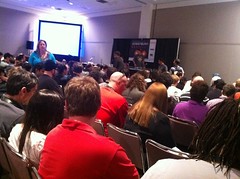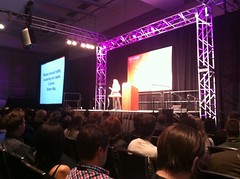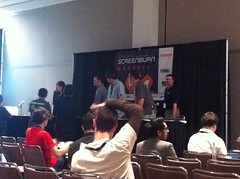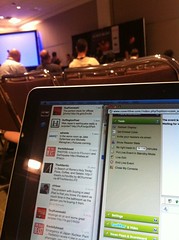#SXSWi 2011 Day 1 Experience
Today was the first day of sessions for South by Southwest Interactive (SXSWi) and it was tough waiting until the 2 PM start time. My anticipation had been building for months: I was ready to learn! And share! I have been resting up, drinking lots of water and charging all my technology (first lesson of SXSW: ABC, "always be charging"). I had my comfortable (yet cute) shoes, my badge and my messenger bag packed as lightly as possible (which is still heavy, given my high maintenance and always be prepared attitude). I just needed the sessions to attend.Anxious to get out of the hotel room and into the crowds, and more than ready to eat, I headed to the Austin Convention Center around noon. Yesterday, I spotted a grilled cheese stand (The Big Cheese) and had been thinking about it ever since. With my grilled cheese and jalopeno chips in hand, I ate my sandwich while standing and staring at the gigantic Samsung screen that was streaming all tweets, checkins and photos tagged with #SXSW or #SXSWi. It was mesmerizing. And egocentric: SXSW attendees didn't need another reason to talk about and tag their experiences. But now they had one; because who doesn't love to see their name in a really large font?With belly full, I set off to find the room for my first chosen session: Turn Your App Into a Cooperative Game. I was 30 minutes early for the session, so I had a great seat and time to get my live blogging session set up. The room filled quickly to standing room only. Gaming discussions are prevalent on the schedule this year and based on the turnout for this session, it looks like they will be popular.The early arrival to stake my claim on a chair was to no avail in this first session. No sooner than the room was full, the presenters had us play a game that required a fruit-basket turnover of the entire room. I managed to find another seat, but I did not participate in the remaining games in an effort to keep that seat. Although I was a little flustered, I did not let this ruin my excitement for the remainder of the day. Outlined below is a summary of today's learnings.
Cooperative Gaming
 Cooperative gaming is the idea of working with and as a team toward an end result rather than a competitive game that pits individual players against one another. (Farmville is an example of a cooperative game.) According to the presenters, Buster Benson and Thor Muller, cooperative gaming has become popular because of its social nature and the innate sociableness of humans:
Cooperative gaming is the idea of working with and as a team toward an end result rather than a competitive game that pits individual players against one another. (Farmville is an example of a cooperative game.) According to the presenters, Buster Benson and Thor Muller, cooperative gaming has become popular because of its social nature and the innate sociableness of humans:
"You win in cooperative games by connecting to people. They work when you need diversity to get to the desired outcome: different skills, different ways of thinking, etc. Games get better when there is more team diversity."
So, not only do people like to play cooperative games (because they feel productive), but they learn how to better work together (because they need each others' specialized skills to reach the goal).
Google's Marissa Mayer
Next session up with with featured speaker Marissa Mayer, VP of Consumer Products. (See my live blogging notes here.) Ms. Mayer focused on the relevance of location data: "The future is the power of here." All related to location data, she provided the SXSW audience with some development updates to Google Maps for Mobile, introduced Hotpot, touched on augmented reality, and discussed the layering of location context to Google Goggles. Some highlights from the Google Maps portion of the presentation included:
Some highlights from the Google Maps portion of the presentation included:
- "Location is becoming more important in search."
- "The mobile phone acts as a cursor connecting the physical and digital worlds."
- 40% of Google Maps usage is mobile. This year, for the first time, on Christmas Day and New Year's Day, mobile usage of Google Maps surpassed desktop usage.
- There are 150 million users of Google Maps for Mobile.
- A demonstration of the enhanced Google Maps for Mobile application that allows the user to pinch and pull down to a 3-D view of the buildings the user seeks to find.
Hotpot is a ratings and recommendations service that launched quietly three months ago. Now with three million users, it is linked to Google Maps and Google Search to provide robust data for the users.With augmented reality, users will enhance reality with digital content related to the space they are standing in at the moment.For Google Goggles, Ms. Mayer hinted at the possibilities of improved image searches using location data.The bottom line from Google: location, location, location.
Games User Research
The third and last session of this first day was on games user research. (See my live blogging notes here.) Admittedly, I was a little out of my league in this session, but it was interesting nonetheless.The session was led by a panel of researchers for video game development. These researchers worked on Guitar Hero, Halo and Call of Duty. So, apparently, they know what they are doing. These are the people that work directly with end users to test usability of games. They had interesting anecdotes:
They had interesting anecdotes:
- "I know I have a good game when the kid actually pees his pants because he doesn't want to stop playing the game."
- "When a seven year old girl cries because she can't find the 'quit game' button, then you know that it is not obvious to her to press the 'escape' key and a button needs to be added to the menu bar."
But, they also conveyed principles that can be applied to all forms of research:
- Don't ask the wrong people about your game: if you pull someone who plays golf games and and ask them to give you feedback on a "shooter" game, you will get bad data. Bad data is worse than no data at all.
- Narrow the focus of the research and test for one goal at a time.
- Behavior target rather than demographically target ("A 70-year old man who plays Quake does so very similarly to a 14-year old boy who plays Quake.")
- Have the designers watch the consumer interaction with their games; designers create a game that is fun for them, but seeing how the real consumer reacts can be eye-opening.
- Everyone thinks they can write a questionnaire and very few actually can. Changing the order of words changes the way people think about their response to the question. Trained researchers know how to do this; interns do not.
My favorite part about this session was the new terminology I picked up: "shooter games" (involves guns), "twitch gamer" (based on reaction times), and "dual thumb sticks" (I still don't know what this means).
The iPad 2
The hot topic today was the iPad 2. Apple set up a surprise temporary store in downtown Austin just for SXSW attendees. Since I did not spend my first day of SXSW 2011 waiting in line, I will not have the new iPad and I know I am going to be super jealous when I see people carrying their new iPad devices tomorrow.How I spent my day instead: More coverage to come tomorrow.
More coverage to come tomorrow.

